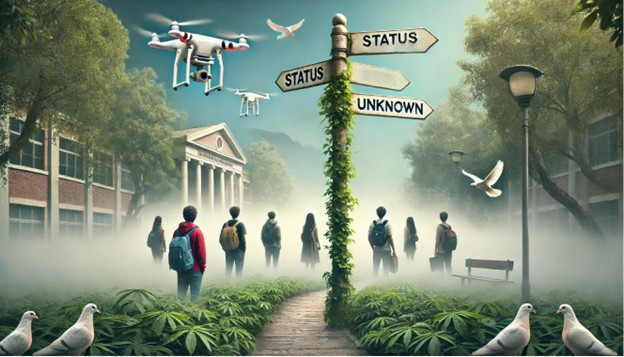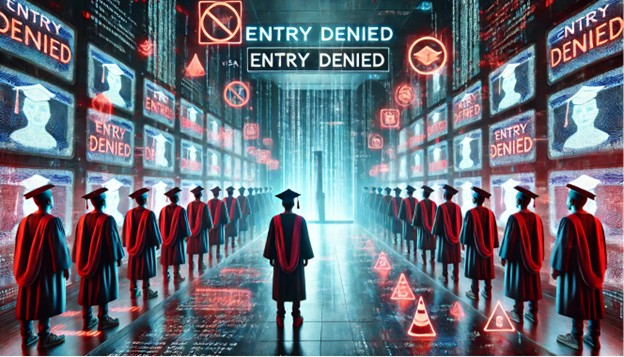Exile by Expression: How the Trump Administration's Crackdown Is Silencing International Student Voices
Input
Modified
Hidden Scope of a Nationwide Purge Fear, Silence, and the Price of Speaking Out The Quiet Exit of a Protester

Hidden Scope of a Nationwide Purge
Momodou Taal stood on the threshold of departure—not just from Cornell University, not just from a country he had studied in and organized within, but from the life he had once envisioned. A joint citizen of The Gambia and the United Kingdom, he had come to the United States like so many others: to study, to participate, and to speak. But now, in the spring of 2025, Taal was packing his things in silence. His visa had been revoked. His legal challenge had failed. And with deportation looming, he made a final choice: to leave the United States “free and with my head held high.”
He announced it on X, the platform once known as Twitter, not long after a federal judge denied his petition to delay his removal. “Given what we have seen across the United States,” he wrote, “I have lost faith that a favourable ruling from the courts would guarantee my personal safety and ability to express my beliefs. I have lost faith I could walk the streets without being abducted.”
This wasn’t just fear. It was resignation. And it was a calculated act of self-preservation. Taal was one of hundreds of international students caught in the wide net cast by the Trump administration’s newly reinvigorated immigration crackdown. His offense, according to the U.S. Department of Homeland Security, was his activism—specifically, his participation in pro-Palestinian protests at Cornell in the wake of the 2023 Israel-Gaza war. On the very day of the Hamas-led attack on Israel, he had posted “Glory to the Resistance” online. Later, speaking at a campus demonstration, he declared, “We are in solidarity with the armed resistance in Palestine from the river to the sea.” For some, it was a political statement. For the U.S. government, it was grounds for expulsion.

Fear, Silence, and the Price of Speaking Out
What happened to Taal is part of a broader campaign—one that has unfolded in quiet but relentless waves across the country’s most prestigious academic institutions. At Harvard University, administrators conducting a routine immigration records review discovered that five international affiliates—three current students and two recent graduates—had lost their student visa status. The notification hadn’t come from Washington. No agents had arrived on campus. There were no press releases or arrests. Just digital footprints—silent updates in a federal database called SEVIS.
The Harvard International Office acknowledged the revocations in an email, without naming the affected individuals. "We are not aware of the details of the revocations or the reasons for them," the office wrote. "But we understand that comparable numbers of students and scholars in institutions across the country have experienced similar status changes in roughly the same timeframe."
Across the country, Stanford University reported a similar discovery. Four students and two alumni, all with ties to activism, had their visas revoked. Again, there were no formal notifications from federal authorities—only discrepancies found during standard checks of immigration records.
But it was in the University of California system that the scope of the crackdown became impossible to ignore. At UC Berkeley, six international students lost their status. UC San Diego reported five cases. UC Davis, twelve. UCLA, twelve more—half of them current students, the other half recent graduates participating in the Optional Practical Training (OPT) program. University officials scrambled to respond, but in many cases, they were in the dark. The federal government hadn’t warned them. Students found out when they attempted to re-enter the country or received letters from immigration authorities.
By the end of March, it became clear this wasn’t a series of isolated incidents. It was a federal campaign. In Guyana, Secretary of State Marco Rubio proudly announced that over 300 student visas had been revoked. “Every time I find one of these lunatics, I take away their visas,” he said in a press conference.
The legal basis for the crackdown, the Trump administration insists, is rooted in the Immigration and Nationality Act—a law that grants the State Department authority to remove non-citizens deemed “adversarial to the foreign policy and national security interests” of the United States. In January, President Trump had signed an executive order targeting pro-Palestinian activism as a form of antisemitism, aligning immigration enforcement with political surveillance.
The arrests and removals, federal officials argue, are part of the administration’s pledge to combat extremism on college campuses. But critics see something else: a chilling attack on freedom of speech, academic expression, and dissent.
The effect has been destabilizing. At UCLA, Chancellor Julio Frenk acknowledged the emotional and psychological toll the revocations were taking on the university’s immigrant population. At Harvard, the administration reaffirmed its commitment to protecting international scholars and decried the growing atmosphere of fear. But legal protections remain limited for foreign nationals, and many students feel they are left to navigate the system alone. Some face detention. Others are forced to abandon their studies. A few, like Taal, choose to leave before agents arrive at their doors.
He is not alone. Ranjani Srinivasan, an Indian Ph.D. student, also fled the U.S. after learning her visa had been revoked. She had participated in student protests, shared her opinions online, and engaged in what she believed was protected expression. When ICE targeted her for removal, she left. “I’m not a terrorist sympathiser,” she told CNN. “I’m literally just a random student.”
She said she hopes to re-enroll at Columbia University and finish her Ph.D. But the future is uncertain, clouded by accusations, stigma, and geopolitical forces far beyond her control.
For many students, the realization has come too late: that their immigration status—once a quiet bureaucratic detail—could now be weaponized against them for the crime of speech. Universities, historically bastions of debate and intellectual freedom, are becoming frontlines of a political crackdown that blends border enforcement with ideological vetting.

The Quiet Exit of a Protester
As spring descends on campuses across the country, graduation banners go up and acceptance letters go out. But for some international students, the mood is different—tainted by anxiety, suspicion, and loss. They walk the same hallways, but now with a question hanging over them: will I still be here tomorrow?
In the days after his departure, Momodou Taal’s social media posts became rallying points for activists. His friends shared messages of support, his professors spoke quietly of injustice, and legal advocates vowed to keep fighting. But the man himself had already moved on—physically, emotionally, politically.
His exit was silent. No press conference. No headlines.
Just a one-way flight. And a promise never to forget.





















